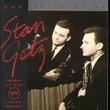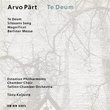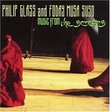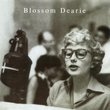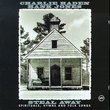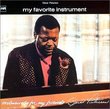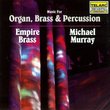| All Artists: John Adams, Edo de Waart, San Francisco Symphony Orchestra Title: Adams: The Chairman Dances; Christian Zeal and Activity; Tromba Lontana; Common Tones in Simple Time Members Wishing: 0 Total Copies: 0 Label: Elektra / Nonesuch Release Date: 10/25/1990 Genre: Classical Styles: Historical Periods, Classical (c.1770-1830), Modern, 20th, & 21st Century, Symphonies Number of Discs: 1 SwapaCD Credits: 1 UPC: 075597914429 |
Search - John Adams, Edo de Waart, San Francisco Symphony Orchestra :: Adams: The Chairman Dances; Christian Zeal and Activity; Tromba Lontana; Common Tones in Simple Time
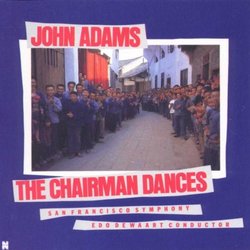 | John Adams, Edo de Waart, San Francisco Symphony Orchestra Adams: The Chairman Dances; Christian Zeal and Activity; Tromba Lontana; Common Tones in Simple Time Genre: Classical
No Description Available. Genre: Classical Music Media Format: Compact Disk Rating: Release Date: 15-JUL-1994 |
Larger Image |
CD DetailsSynopsis
Product Description No Description Available. Genre: Classical Music Media Format: Compact Disk Rating: Release Date: 15-JUL-1994 Similarly Requested CDs
|
CD ReviewsPromises kept Grady Harp | Los Angeles, CA United States | 03/26/2002 (5 out of 5 stars) "Asked by a friend to recommend an intoduction to the music of John Adams, I recommended this rather short disc. Not only because it has such accessible works by this major talent, but also because it allows the listener unfamiliar with the minimalist terrain enough samples to stimulate further investigation. Recorded in 1987 the San Francisco Symphony under Edo de Waart sounds a bit thin, but that too is a reason to start here. Much of Adams' music is played by this orchestra and since Michael Tilson Thomas' rise to the helm there has been an extraordinary sea change. After hearing this recording, play the 1997 recording by the same orchestra (led by Adams) performing the "Harmonium" and "The Klinghoffer Choruses" and I think you'll note the difference, sonically and stylistically.. And while you're comparing you will have grown into the more major later works of Adams!" Maximum Minimalism Erik North | San Gabriel, CA USA | 03/26/2006 (5 out of 5 stars) "Along with Phillip Glass and Steve Reich, John Adams is one of the foremost composers of what is often called "minimalist music." To classical fans who have been weaned on everything from Handel and Bach through Beethoven, Wagner, Mahler, and Aaron Copland, the very notion of minimalist music, with its repetitious rhythms, might seem a turn-off. When, however, you get a world-class orchestra like the San Francisco Symphony and a solid conductor in Edo De Waart (who was the orchestra's music director from 1974 to 1985), who premiered many of Adams' pieces and who know them perhaps better than any orchestra around, the results are fascinating, as can be gauged in this Nonesuch recording. It consists of "The Chairman Dances" (from the composer's 1985 opera "Nixon In China"); "Christian Zeal And Activity" (with an admittedly somewhat ponderous evangelical sidebar stuck in there); "Tromba Lontana"; "Short Ride In A Fast Machine" (almost certainly this composer's most popular single piece, and for good reason too); and "Common Tones In Simple Time." As is typical for Adams in particular, and minimalist music in general, the orchestration is varied and vibrant, occasionally using glockenspiel and synthesizers. If one has heard John Williams' eerie scores to Spielberg's films ALWAYS and A.I.: ARTIFICIAL INTELLIGENCE, one can tell how influential the minimalist movement has been on other composers of our time. For those who are just getting introduced to minimalism and who may be a bit uneasy with the form, this great recording is a perfect introduction to the form. For those who are already very much into it, this is essential." Must Own accroya | Las Vegas, NV United States | 01/18/2002 (5 out of 5 stars) "If you have heard of John Adams but didn't know which CD to buy, this is definitely the one to get. From the exuberant opening title track to the mesmerizing "Common Tones in Simple Time" there is not a second you will glance at your watch. Don't be fooled by the misleading "minimalist" label. This is solid orchestral music at its finest."
|

 Track Listings (5) - Disc #1
Track Listings (5) - Disc #1